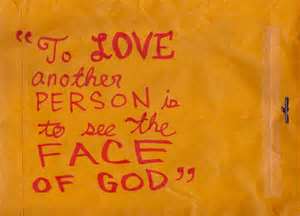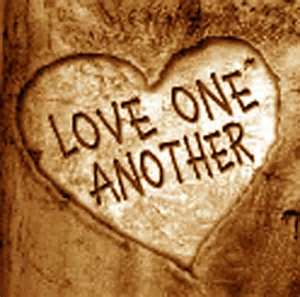Take my hand And lead me to salvation Take my love For love is everlasting And remember
The truth that once was spoken …

Beautiful lines from the Les Miserables finale, but what exactly does it mean? How is God’s face seen in the love of another person?
Since the lines were sung by the characters Valjean, Fantine and Eponine, I have to think this was their reality. They believed in that once spoken truth. They saw God through another’s love.
In discussing Valjean in last week’s post, we saw what effect the bishop extending a second chance “to become an honest man” had in transforming Valjean’s life. The love and grace he experienced led to him reciprocating that same type of love and grace toward Fantine.
Fantine was his dying factory worker who had been desperately trying to support her young daughter, Cosette. I think Valjean personally identified with her; after all 20+ years prior, the bread he stole deeming him a thief, was for his sister’s young child. He understood first-hand the struggle and desperation of working to supply the needs of a child.
Out of compassion toward both Fantine and Cosette, Valjean sat at Fantine’s deathbed and promised to care for Cosette. And until his own death he did exactly that. His world was Cosette and every decision he made based out of love for her.
By his love Valjean was imaging forth God. God created each of us in His image, and though sin distorts that image by His grace we can still reflect His glory to others. When we are captivated by His love for us, we are driven outside of ourselves to revolve our lives around others, putting their interests ahead of our own desires. In this way we fulfill our calling to be “imitators of God” and “to walk in love” (Eph. 5:1-2).
Being created in the image of God and made for one another produced the innate longing to be loved that Eponine craved. She was the the lonely daughter of the bawdy innkeepers and actually had much in common with Valjean and Fantine. As an interesting side note all three showed love to Cosette in various ways. But more significant is the rejection, hatred, agony and desperation all three experienced.
The difference for poor Eponine is until her death she remained unloved. And, in knowing what love was not, she longed for what it is. She longed to be loved and cared for the way she saw Cosette loved by Valjean and also Marius. There was a sense that life was not how it should be, which it wasn’t for her, or any of us.
Because of sin, we will never be fully satisfied here on earth; there will always be rejection, hatred, agony, desperation, struggle, disappointment. We will not reflect God to others the way we were created to and others will fail to reflect God to us.
But God in his goodness and grace gives us little pointers. Pointers to something better. Pointers to who He is. Pointers to a day when His children will behold Him face to face. These pointers come when love is shown and He is reflected through the human love of another.
This Valentines Day if you see more of who God is because of the love of another person, praise Him for it. But if you feel more like Eponine, rest knowing there is only One who loves perfectly. Only One who will make all things right. Only One who by His love can fill us up completely. And when we find that in Him, we can then pour out His love on others.
“Beloved, let us love one another, for love is from God…We love because He first loved us.” 1 John 4:7,19
Don’t want to miss a post? Enter your email on the upper right-hand column after “Follow blog via email”.


Thanks for the beautiful explanation….